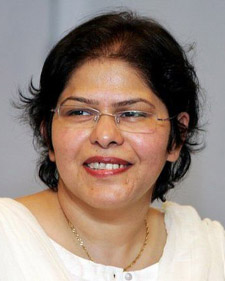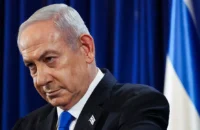by Ayesha Siddiqa
Pakistan’s establishment has much to celebrate after Moeed W. Yusuf, special advisor on national security and strategic policy planning to Pakistan’s Prime Minister, gave a successful interview to Karan Thapar. Notwithstanding the fact that the interview was a personal gain for Yusuf, it also succeeded in delivering the most important message from Pakistan: the Imran Khan government was not interested in talks with its Indian counterpart, and that Islamabad is prepared to fight the battle of narratives with India, which it didn’t find easy in the past.
Thapar’s peculiar interview style – the constant interruption and not allowing the guest to complete his thoughts and resorting to counter-argument – put Pakistan’s special advisor in a most favourable position to take the interview where he wanted. Yusuf had come prepared for Karan Thapar and also for questions that an Indian anchor would ask a person in his position. A flustered senior anchor was soon unable to ask details of when the supposed call was made by the terrorist involved in the 2014 Peshawar school terror attack to the Indian High Commission and to whom. Nor was Yusuf asked why such critical information was kept away for so many years from the families of those who died and have expressed dissatisfaction with the recently released inquiry report.
Again, Yusuf was not challenged about his claim of equivalence with India’s National Security Advisor (NSA) Ajit Doval. The fact is that Pakistan has no NSA since the last one, Lt General Naseer Janjua (retd), resigned in June 2018. Yusuf is special advisor to the prime minister, a position that, according to the Islamabad High Court decision of August 2020, does not even allow him to perform any executive functions in the National Security Division where he is placed. A Special Advisor to the Prime Minister (SAPM) can’t even be a spokesperson for the government.
The interview given to The Wire can only scuttle talks, which is perhaps what was intended. Why is Pakistan talking now when it feels confident? Disclosing information about some possible back-channel conversations means that the back-channel is completely out of India-Pakistan bilateral, even if Pakistan wants to use it in the future. The disclosure firmly nipped the idea of any talks in the bud because Delhi will not be able to afford admitting to some private conversation. Moeed Yusuf undertook a military rather than a diplomatic manoeuvre. The interview, hence, indicates a mindset that views realism from a narrow security prism. And its timing served a combination of interests – Yusuf’s personal, Imran Khan’s political and the Pakistani deep state’s geo-political.
A central security voice
Moeed Yusuf aims to become a prominent voice on security and foreign policy. Having ridden back from Washington on Imran Khan’s shoulders, Yusuf wants a more secure future in Pakistan and a permanent seat on the security/foreign policy table, which is why he seems to have diversified his patrons. Like a select group of existing politicians, he aims to become indispensable both to the political elite and military establishment. The Thapar interview has opened more avenues for him. He may now be groomed for a longer stint secure from the tribulations of a political party while existing with it. The Foreign Office, which up until now did not open its doors to him, would probably begin to take him more seriously, especially when Foreign Minister Shah Mehmood Qureshi doesn’t enjoy the most favoured position. Sources say that since the clash with Riyadh, Qureshi is no longer invited by the military to important meetings on Afghanistan or other issues.
Gone are the days when the SAPM was mainly responsible for minding the operation of repatriation flights for Pakistanis due to Covid. Yusuf seems to be working towards developing a group of experts around himself who would eventually dominate the security/foreign policy discourse. The deep state, in any case, has wanted forever for the security narrative to become more centralised. Yusuf seems to be advocating for Pakistani scholars to follow his example in trusting information provided by the state to shape their analysis. He did not explain how the veracity of official information could be verified without putting one’s life at risk or in an environment of censorship.
For Prime Minister Imran Khan, who is increasingly being challenged by the political opposition, the interview was good news because it presented him as a stable strategic thinker and not someone who is incapable of running his own policy. Moeed Yusuf scoring well domestically will benefit the political boss.
However, the much bigger goal pertains to fighting the battle of narrative with India at a time when New Delhi is not in its best form. Pakistan has the confidence of its handling of Balakot, compounded with its partnership with China. The China-India conflict poses a burdensome two-front situation for New Delhi that can get tiring, as it used to be for Pakistan in the past. India’s neighbourhood is changing as well. India may negotiate with the Quad, but its immediate neighbourhood is no longer its strength. Its domestic politics has serious implications for its foreign relations.
Not that communal tension and violence is new to India but the direction it has taken and its nature under the second tenure of the Narendra Modi government has eroded a lot of India’s past strength, especially as far as the battle of narratives is concerned. The civil societies of South Asian states, including Pakistan’s, which always longingly looked at India’s democracy, are becoming increasingly uncomfortable. The BJP government seems to have abandoned the idea of inclusivity, outreach or India’s relevance for the rest of the region. This is a wicket on which Pakistan believes it can play India by highlighting problems like censorship, gagging of critical voices, maltreatment of minorities while ignoring its own.
Establishing equivalence between India and Pakistan
Yusuf outlined a new framework for Pakistan’s future engagement with India – Islamabad will draw equivalence between itself and New Delhi. India will itself label India for committing all those sins that Pakistan was once accused of. It will say that India is also involved in terrorism and Pakistan is not the only bad guy on the block. The repeated refrain that India and Pakistan had both changed was important. It meant that India should no longer be considered as having moral authority nor should Pakistan be viewed as a weak state of yesteryears. India’s reduced civil liberties, rising communal tension, and clampdown on media make for an image that is to Pakistan’s advantage.
Islamabad looks ready to work on two tracts. First, plug holes at home by disciplining all voices that have claimed in the past or continue to talk about links between the state and militant organisations. Second, publicise India’s supposed ‘involvement’ in fanning and financing insurgency in Pakistan that could neutralise the moral high ground Delhi once held. The Kulbhushan Jadhav case was indeed a major breakthrough. Islamabad may hide information from its own people, but if it has more information, it would certainly will pile it at the door of the Financial Action Task Force (FATF) when India goes for review in 2021. Furthermore, the equivalence helps mitigate Pakistan’s own involvement in the Mumbai 26/11 terror attack.
Establishing equivalence is important both tactically and strategically. In terms of the former, the context is Afghanistan. Islamabad will use evidence of India’s ‘involvement’ in aiding terrorism in Pakistan to argue for New Delhi’s exclusion from Afghanistan talks. India’s continued presence would destabilise Pakistan, Pakistan-Afghanistan relations, and, hence, the success of the peace initiative. Strategically, the underlying argument is that it is India that has become a ‘rogue state’ that Pakistan was accused of in the past. While a Hindutva-dominated state is generating terrorism on ideological grounds, Pakistan has changed. Besides the fact that China and Pakistan are strategic partners, disassociating from the Uyghur issue is intended to depict Pakistan as not supporting pan-Islamism. The Kashmir issue, however, will continue to be supported by Pakistan on humanitarian grounds, and for its own historical claim.
Kashmir and Gilgit-Baltistan
The Moeed Yusuf interview was aimed at putting Pakistan back in the Kashmir Valley. Yusuf presented a clear position from Islamabad on Kashmir that reiterated Pakistan’s commitment to the cause instead of its abandonment, which was feared by many quarters. It would be worth watching if it generates any response in India’s Kashmir. It certainly got traction among Kashmiri groups abroad, especially those close to Pakistan, such as Ghulam Nabi Fai who immediately issued a statement endorsing all points raised by Yusuf on Kashmir including placing Kashmiris on the negotiation table. The SAPM, however, didn’t say which Kashmiri will sit on the table and who would make the selection.
One of the most important points, however, pertained to Pakistan’s insistence on India to follow the Simla Agreement as understood by Delhi – any settlement of dispute or any alteration in the territory has to be done through bilateral discussions. This framework also puts Pakistan in a bind because it is confronted with the situation in Gilgit-Baltistan. Islamabad is conscious of people’s demand in the area to be given the status of a province. Rawalpindi, however, is conscious of the impact of such a decision on Pakistan’s position versus India’s, which is why Yusuf totally ducked any question on the domestic debate on the matter. He, in fact, insisted that no decision had been made yet. This means that Pakistan may be able to fulfil the desires of the people of Gilgit-Baltistan by using the example of changes by India with the expectation that this will not affect its claim over the rest of the territory.
Clearly, both sides will create their own solutions for territories under their control. Having lost the last moment at Agra for peace, the subcontinent is back to square one. The changes on both sides at the political, societal and ideological level are rapid and will have a long-term impact on the desire for peace.
Ayesha Siddiqa is research associate at SOAS, London and author of Military Inc; Inside Pakistan’s Military Economy. She tweets @iamthedrifter. Views are personal.



























